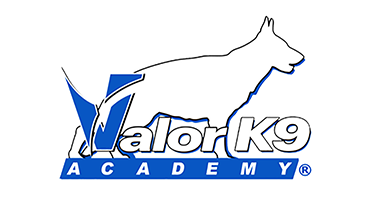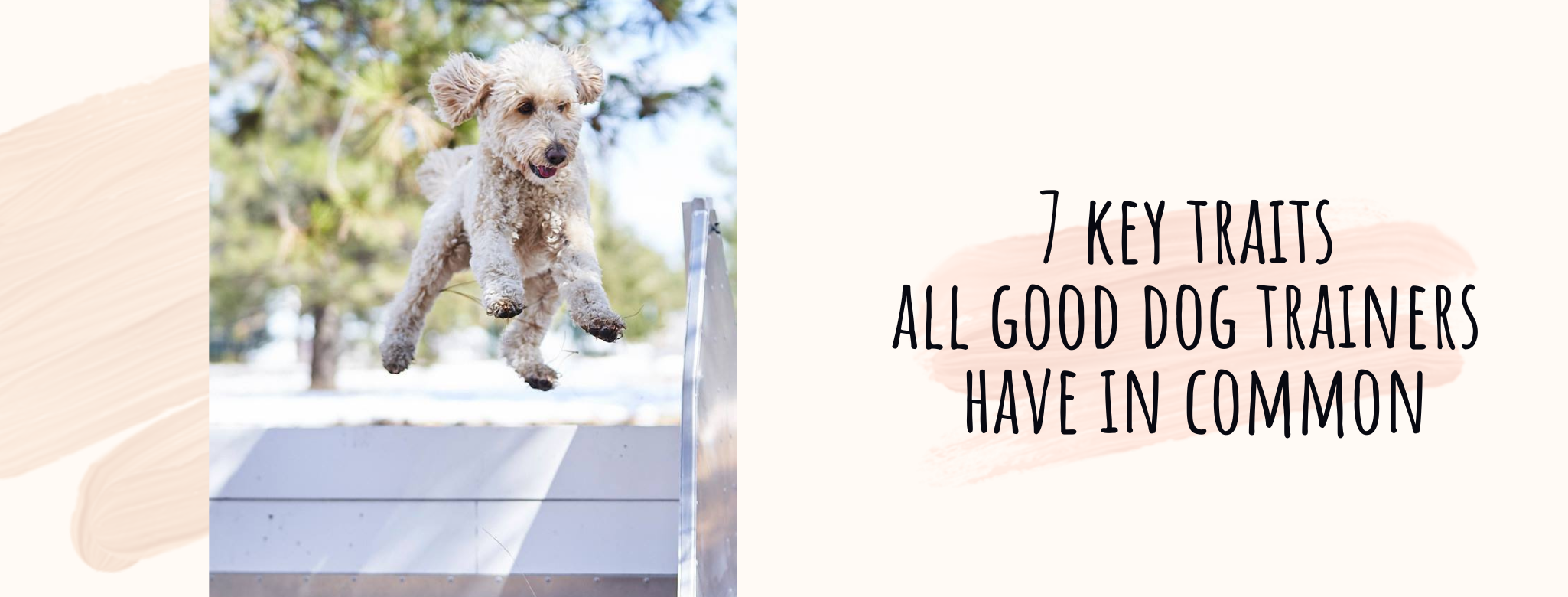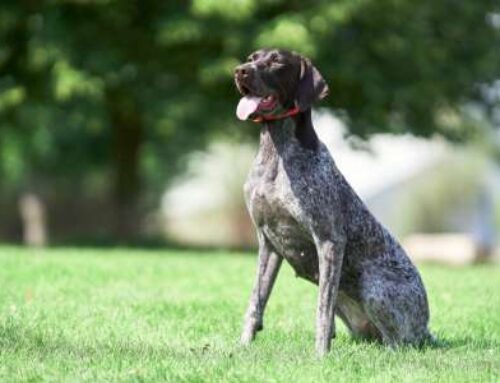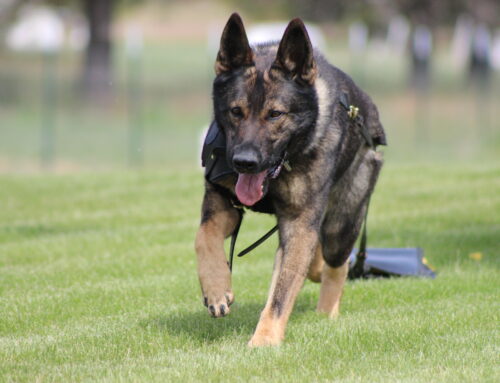Dog trainers are a dime a dozen. Good dog trainers are far and few between. So what should you look for when you’re looking for a dog trainer? Here are 7 key traits all good dog trainers have in common.
1. Good dog trainers have experience.
In any industry, experience is the best teacher. Big or small, we learn something from every dog and owner we work with. The more experience a dog trainer has, the more quickly and easily that trainer will be able to assess and train your dog. I can see a photo of a dog and give an accurate read on that dog’s temperament. A photo!!!
In my opinion, experiences comes through training dogs only. I say this because there are a lot of dog trainers out there who boost inaccurate information about their experience with dogs. “Thirty years experience training dogs” does not necessarily mean that person has been training dogs for thirty years. In fact, someone recently who put that in his bio was literally in a completely unrelated career field just a few years ago. So tell me, what is that experienced based on? Did you have a dog as a child? And now you’re counting that towards your experience?
Be careful what you read and believe. People will say anything these days to look bigger and better than they really are. The proof is in the pudding. Show me the thousands upon thousands of dogs that you trained all those thirty years.
I started training dogs when I was around eight years old. And I trained dozens of dogs in the military. But I claim only 10 years of experience training dogs, because that’s when my professional career began. That’s when the rubber met the road, and I started working with paying clients. If you’re not getting paid for it, you’re a hobby dog trainer and not a professional.
It’s like applying for a restaurant position and saying that you have # number of years’ experience as a cook. Making dinner at home for your family doesn’t count, bud. If you didn’t get paid to do it, it doesn’t count.
Look for dog trainers who’ve studied under the best of the best – that will expedite their growth – or trainers with at least three years of experience.
2. Good dog trainers show proof.
The proof is in the pudding, remember? Show me the money! Show me the dogs you’ve trained – their before and afters. Show me the testimonials. Show me the photos of dog after dog going through your training program.
Social media might be a pain in the butt at times, but it’s proof that we are working with dogs day-in and day-out. Our numbers aren’t fabricated or made up. Since our start, Valor K9 Academy has trained thousands of dogs. Probably close to 6,000 or 7,000 at this point with the massive numbers of group classes and workshops we held in the past. My personal number (from that total) is probably 5,000. Maybe more. And I have proof of dogs from day one as a professional trainer to today (hello, Puppy Head Start online program!).
Look for that proof. I prefer unedited clips. Bare bones dog training. Show me what you started with, and where you got the dog to. What was the dog’s demeanor before training? And what’s the dog’s demeanor, attitude and level of training now? I have countless edited (or barely edited) videos out there from my early days of training, and my trainers are required to record proof of each board & train dog’s progress through training. We share those videos on our YouTube channel for all to see.
3. Good dog trainers are an open book.
They have nothing to hide. They don’t disguise themselves as positive and then use prong collars on day one, like some dog trainers. They don’t pretend to be something or someone they’re not. There are three schools of thought in dog training: old school, balanced and pure positive. And within each school of thought, there are a thousand ways to skin a cat. (Cat people, excuse my metaphor! I have a cat. I love her. Her name is Kat.)
We are open about our philosophy and methods. They’re posted on our About page. We also gladly answer any questions clients have about us. We don’t require you to book a consultation first or pay a deposit in order to get to know us better. We aren’t too busy to care about your concerns and curiosities.
The only thing we don’t offer is a tour of our facility, and that’s simply because we don’t have one. (Yet!) Our trainers all work from home. Back when we did have a facility in Spokane, I offered Open Houses. It was a great way to meet me, introduce your dog, and ask questions.
Another way we’re an open book is we post our programs and prices on our website. Most trainers post their programs, but they want you to call them first as opposed to posting their prices. That’s fine. If you need the business. But we’re booked. So we’re happy to share our prices online – in complete transparency – so that you can decide for yourselves if we’re affordable for you or not.
4. Good dog trainers are busy.
You heard that right. We’re busy. Dog training isn’t a 9-5 thing (for us). It’s a 24/7 job that requires constant dedication and devotion to the animals in our care. Good dog trainers have boundaries, but that doesn’t mean we’re not busy. So if we don’t call you back right away, chances are we’re working with another client. In some cases, lessons can last for two or even three hours. And on top of that, when we’re in lessons, we have a household of dogs waiting (impatiently) to be worked and trained. So just because our lesson is over doesn’t mean we’re free to do office work.
Usually, office work (returning phone calls and emails) happens in the evening when our dogs are worked and tired. (Dogs don’t come to us with inherent off switches, it’s something we teach throughout the course of training. Most dogs new to training are quite demanding – and obnoxious!) They just don’t know how to settle. And that means more work for us, in the beginning at least.
We shoot for a 24 hour callback. That means, if you call at 5pm on a Monday, we will try to call you back by 5pm the next day (Tuesday). If you call on a Saturday night, don’t expect a call on Sunday. You’ll hear from us Monday, maybe even Tuesday. We all try to take at least one day a week off from (people) clients, and that’s usually Sunday for most of us. We still train board & train dogs on our day off.
5. Good dog trainers are booked.
We don’t have availability tomorrow to take your dog for a three-week board & train. Sorry. No way, Jose. Every once in a while, do we have a last-minute opening come up? Sure, but that’s far and few between. As a general rule, for most of our programs, we’re booked anywhere from 2-3 months in advance. Sometimes 4 or more. It really depends on your dog’s age, temperament and training goals.
My trainers make their own schedules and take as much vacation time as they want to. Oftentimes, several weeks each year. (And good for them!) What we do is hard work; taking time off is necessary so we can be our best selves for you. What that means is space is limited. We may not have an opening as soon as you’d like. What that also means is we’re aren’t overbooking ourselves, we’re not burnt out and we’re not going to fail you or your dog because of poor time management on our part.
6. Good dog trainers aren’t cheap.
I’ll say it again for the people in the back. Good dog trainers aren’t cheap! You pay $150 to get a partial highlight and trim while your stylist works on other clients at the same time. And you pay $150 for a good steak dinner. Why should dog training be 20 bucks an hour? I’ll never understand why some people have such a hard time understanding the value of time and experience in training.
A good dog training business doesn’t just happen overnight. Granted, a brand-new dog trainer with zero experience who’s learning as she goes should be making 20 bucks an hour. But the rest of us? Those of us who’ve put in the work to get to where we are? This is a niche industry. Very few dog trainers are truly good at what they do and are able to help not hurt your dog’s training progress.
This photo says it perfectly:

We’re also faster and more efficient at getting good results. What that means is, you won’t have to spend 5 or 6 months going to dog training – carving time out of your week to go to weekly lessons – just to teach your dog basic obedience. We can teach it in 6-10 weeks as opposed to 20 or 30 weeks. In the end, you pay the same amount.
I can’t tell you how many dog trainers drag things on and on so they can keep collecting pay instead of just getting results. It’s not that they don’t want to, in many cases, they can’t. They don’t have the skills to get results quickly. And who knows, maybe your dog is the first dog they’ve ever worked with that has that issue. Now that’s a scary thought, isn’t it! Very few dogs in the past five years have ever been firsts for me.
7. Good dog trainers have good dogs.
“Oh Amy, all dog trainers have well-behaved dogs!” WRONG! They’re all over the board. I’ve met trainers who have their one, trained demo dog – the dog they’ll freely show you – and a handful of other dogs who live their lives in crates because their owner is too busy to train them. Yes, dog trainers who don’t train their own dogs! They collect them like coins and then they leave them in their crates to rot.
Very few trainers – and only very dedicated ones – can satisfy and meet the needs of more than two or three personal dogs on a regular and daily basis. I’ve been training for a long time, and three is my max. That’s the number of dogs I’ve found I can comfortably own and feel good about, knowing they have a good life. Before I lived on all this land in Idaho, it was up to me to exercise my dogs. And space was somewhat limited. I did a good job of it, but it took a lot of work and energy on my part. Early mornings and late nights. I never let my dogs’ well-being suffer because I was too busy taking care of everyone else’s dogs. Sadly, not all dog trainers follow that same creed.
Most dog trainers have that one good demo dog, and the rest of their dogs are a hot mess. Reactive (most common). Aggressive (more common than you’d think). Under-socialized (literally, zero excuse for this). Skittish. Even fearful. I’ve been nearly bit by more than one trainer’s dogs on more than one occasion. And by several “social media popular” trainers’ dogs as well!
I’ve also seen trainers’ dogs who live in complete filth. I’m talking dirty kennels, nasty crates, just YUCK. Those poor dogs. I have zero tolerance for that. If that’s how they’re treating their dogs, imagine how your dog will be treated? Not much better, I’d think.
There’s a reason I’m proud of my pack. They represent me as a trainer. And I freely post their good quality of life (mostly on the Valor Protection Dogs YouTube these days). They live great lives, and you’re welcome to come meet them (and work with them) any time. (Not really, but you know what I mean! I do let clients work with them, but please don’t show up at my door and ask to train my dogs ha!)
My team also does an excellent job caring for their personal dogs. They treat them like family. They’re my A-Team and I couldn’t be prouder!
And with that, I’m going to close. I went off on a lot of tangents here (sort of), but I want to put out information into the worldwide web that will maybe help someone someday to avoid sending their dog off blindly to a bad trainer. There’s a lot more to dog training than you might realize. Do your research. Get quality help for the dog you love.




Leave A Comment